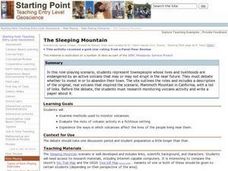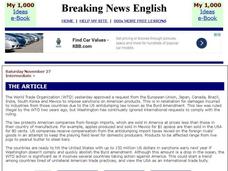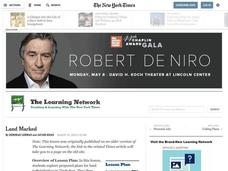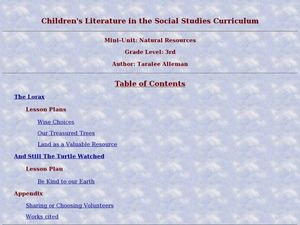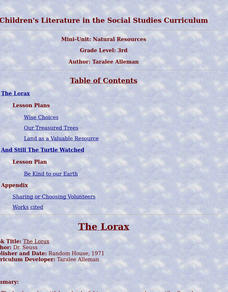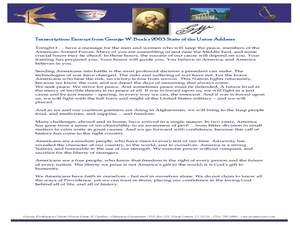Curated OER
Understanding James Madison The Father of the Constitution
Learners research James Madison and create a table of his strengths and weaknesses. For this James Madison lesson, students read Jean Fritz's, The Great Little Madison, while developing their research skills, vocabulary strategies, and...
Curated OER
Development of Labor Unions
High schoolers examine the conditions that led to organized labor unions. In this 20th century America lesson, students compare and contrast the Knights of Labor Constitution, the American Federation of Labor Constitution, and the...
Curated OER
Marine Protected Areas
Students role play different stakeholders perspective on the debate about Channel Islands. In this marine science lesson plan, students identify different types of Marine Protected Areas. They research about their stakeholder's point of...
Curated OER
A Delicate Balance
Students reflect on racial balance in their own schools, debate merits of policies that seek to create and maintain school racial diversity, and write essays on whether their school should promote racial balance.
Curated OER
The Sleeping Mountain
Students conduct research on the activity of Mammoth Mountain, a volcano in California. They role-play as townspeople whose lives and livelihoods are endangered by an active volcano that may or may not erupt in the near future. They...
Curated OER
Canadian Landscapes
Ninth graders compare landscapes in their own community to landscapes in other Canadian communities. They discuss how the environment affects the identity of a given community / country.
Curated OER
The Age of Reform
Students are introduced to a variety of reform movements within this lesson. They explore the beliefs and motivations of each group. Connections are made from these movements to present day situations and happenings.
Curated OER
The Federalist Papers
Students identify the Articles of Confederation and explain why it failed. They explain the argument over the need for a bill of rights in the Constitution and James Madison's role in securing its adoption by first Congress. Finally,...
Curated OER
Donkeys and Elephants and Voters, Oh My!
Students celebrate party politics. In this American politics lesson, students discover what the 2 main political parties in the country are and discuss their functions. Students then participate in a classroom simulation that requires...
Curated OER
Breaking News English: Jordan
In this Jordan worksheet, students read the article, answer true and false questions, complete synonym matching, complete phrase matching, complete a gap fill, answer short answer questions, answer discussion questions, write, and more...
Curated OER
Breaking News English: World Trade Organization
In this World Trade Organization worksheet, students read the article, answer true and false questions, complete synonym matching, complete phrase matching, complete a gap fill, answer short answer questions, answer discussion questions,...
Curated OER
A Campfire Conversation
Students examine point of view as it relates to public issues. In this point of view lesson, students become familiar with the point of view of John Muir and Theodore Roosevelt about the wilderness. Students debate if the wilderness...
Curated OER
Land Marked
Students explore proposed plans for land redistribution in Zimbabwe. They research the history of European colonization in Zimbabwe, focusing on the roles and views of various groups within the country. Based on these perspectives, s
Curated OER
Backward Lesson Plan
High schoolers explore and analyze the position of freedmen in the post Civil War period as well as the impact of Andrew Johnson's presidency on Reconstruction. In addition, they evaluate the laws and amendments that were put in place...
Curated OER
By Any Other Name
Students examine the differences between the definitions of race and ethnicity defined by the United States government. After reading an article, they discuss the possiblity of the elimination of some races from the 2010 census. They...
Curated OER
The Lorax
Third graders identify environmental problems. In this natural resources lesson plan students participate in several activities that support critical thinking about the environment and natural resources. The students write, list, and...
Curated OER
Land as a Valuable Resource
Students investigate why the soil is important to our lives. In this natural resources lesson, students have a farmer as a guest speaker. Students begin to understand how farmers use and protect our natural resource. Students write...
Curated OER
ESL/EFL Lesson - Impeach Tony Blair?
In this ESL/EFL reading comprehension lesson, students read an article entitled, "Impeach Tony Blair." They participate in discussion activities, debates, and answer a variety of question types based on their comprehension of the article.
Curated OER
George Washington's Foreign Policy
Learners compare George Washington's foreign policy to the policies of presidents who followed him. In this primary source analysis lesson, students compare Washington's Farewell Address to the Roosevelt Corollary, the Monroe Doctrine,...
Curated OER
Town Development
Young scholars evaluate how the impact of building of towns affected slavery. In this United States History lesson, students work in small groups to construct a map, then they participate in a role-playing activity.
Curated OER
Homegrown Terror
Students investigate history of domestic terrorism in six European countries; they analyze and write about differences between terrorist acts planned and committed by a country's citizens and those planned by groups or individuals...
Curated OER
Get a Life!
Students read a New York Times article associated with the issue of the decoding for genomes, the creation of life in scientific laboratories and various genetic engineering topics. They present speeches of the pro's and con's of these...
Curated OER
The Cold War: Planning for Survival
Students prepare a documentary-style dramatization about government and personal measures taken to ensure survival in the event of nuclear war.
Curated OER
Calling Names
Students explore how language shapes debate by researching the names and tags both advocates and opponents use when discussing a topical issue. For homework, they create name collages and write prose poems.






